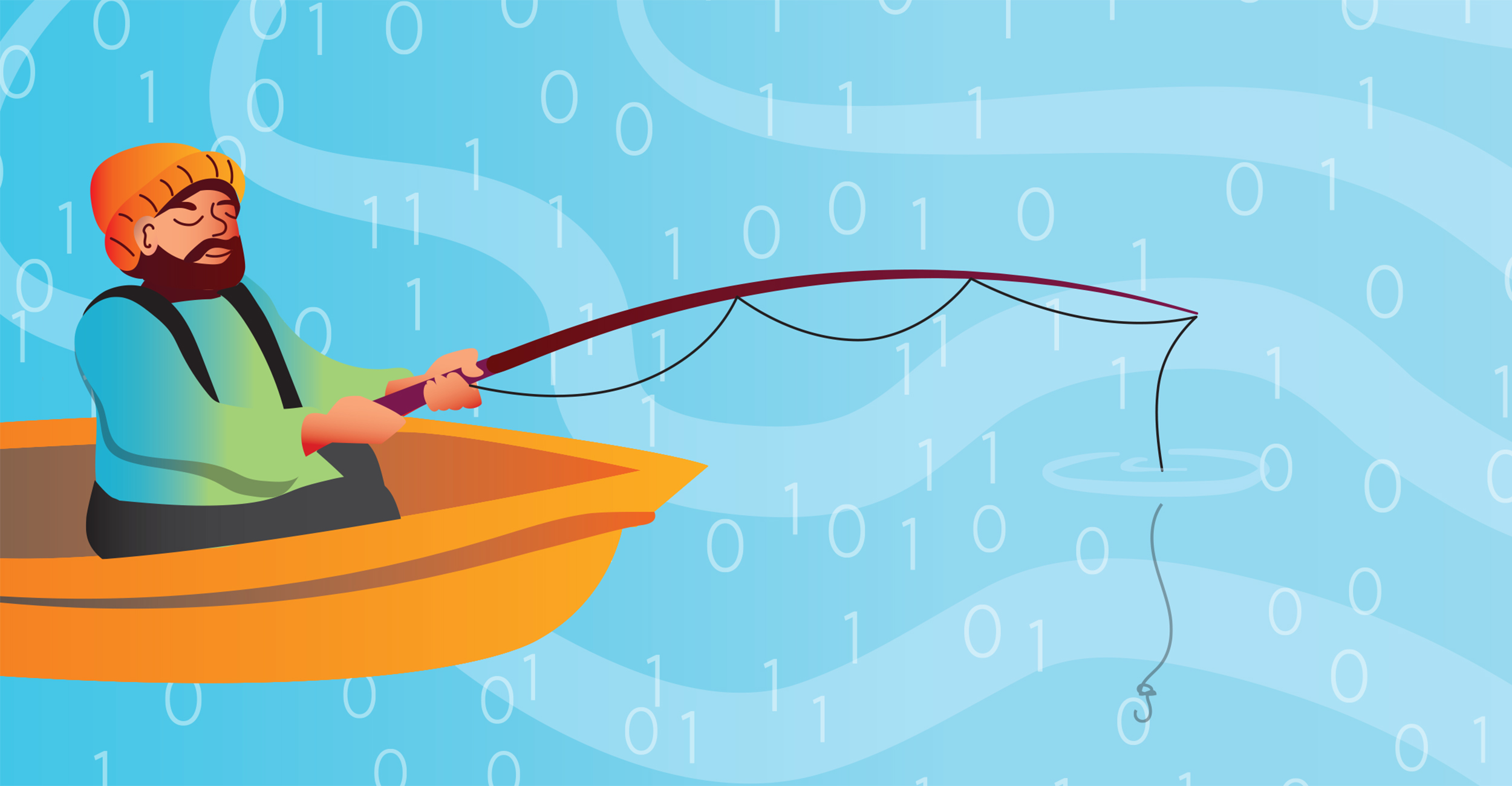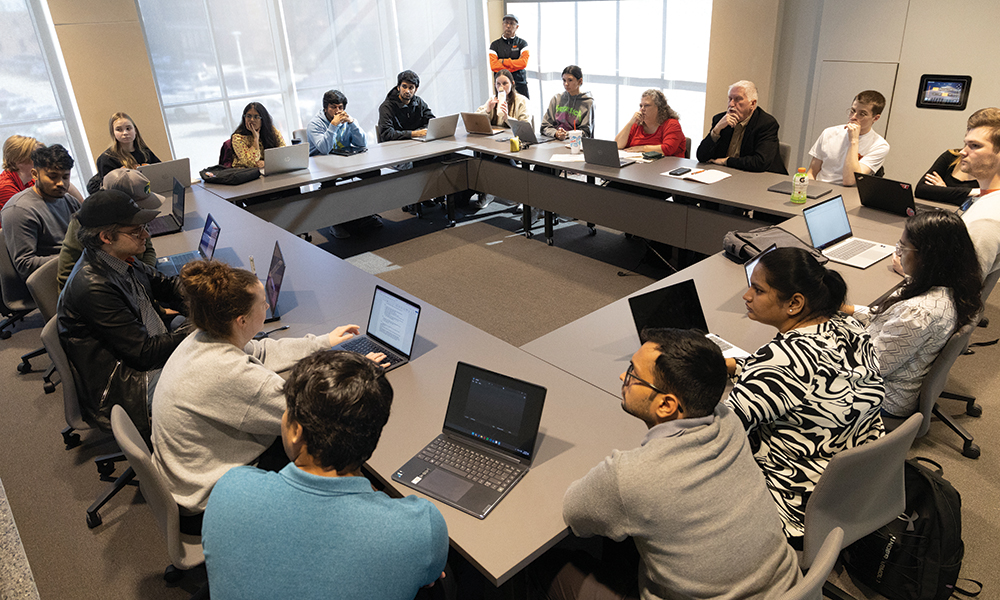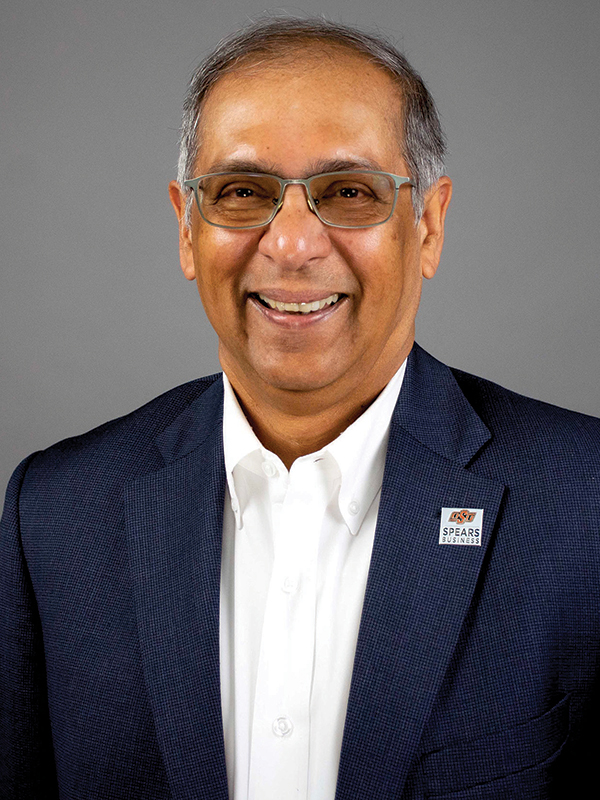
Great lakes: MS BAnDS students build data lake to advance chiropractic research
Thursday, November 13, 2025
Media Contact: Stephen Howard | Director of Marketing and Communications | 405-744-4363 | stephen.howard@okstate.edu
When Dr. Goutam Chakraborty welcomes a new cohort of Master’s in Business Analytics and Data Science students, they immediately begin a real-world project.
The MS BAnDS director in Oklahoma State University’s Spears School of Business doesn’t expect the students to know everything on Day 1, but he wants them to embrace the challenge.
“You’ve got to jump in with two feet, and you’ve got to grab the bull by the horns and go for it,” Chakraborty said. “It’s going to be a wild ride but hang in there and learn as you go along. That is our motto.”
MS BAnDS students shared his bold philosophy as they built a data lake to advance chiropractic research, making a societal impact while gaining invaluable industry experience.

The graduate students partnered with health analytics company Infinedi on the immersive project over two semesters in Dr. Miriam McGaugh and Dr. Sarah Chabinak’s Research and Communications course. The group also created a website where researchers can survey anonymous patients and chiropractors represented in the data lake, gaining insights to advance chiropractic care.
These experiential learning opportunities define the MS BAnDS program, fueling its rapid rise in national rankings. Housed in the Watson Graduate School of Management, the in-person program is No. 2 in the nation according to Fortune.com, trailing only Harvard University.
Brad Cost, Infinedi’s CEO and owner, didn’t assign the data lake project to generate a profit. He plans to grant researchers free access to the data lake and website, eliminating the hefty price tag that often comes with exclusive data.

“Over time, this will generate good research that will really help people,” Chakraborty said. “This is data that researchers can use to maybe find better treatment or track treatment to see what works and what doesn’t work. We really needed the data to be pulled together as a whole so you get a 360-degree view of the patient.”
Chiropractic research is growing at prestigious institutions such as Dartmouth and Duke University, but obstacles exist. Chiropractic data has historically been fragmented, making it difficult to synthesize.
Cost, an OSU graduate who serves on two national committees guiding the chiropractic profession, saw a need for change.
He knew to contact Chakraborty.
Cost is a longtime member of OSU’s MS BAnDS Corporate Advisory Board, which consists of professionals from companies that include Amazon, Gap Inc., Paycom and Walmart. Board members help guide the program’s development and present real problems for students to solve.
“The progression of these projects has only occurred because we are listening to those companies, and our advisory board is telling us what their experience is with these projects,” McGaugh said. “We make changes, and the projects have grown.”
Although the MS BAnDS program regularly tackles in-depth projects, Cost knew the data lake was no simple request. He asked Chakraborty if the students were ready.
“I don’t know,” Chakraborty said. “But they will learn as they go along.”
While MS BAnDS faculty and Infinedi offered steady guidance, 18 students across three groups did the heavy lifting, from concept creation to programming. They completed the project over the 2023-24 academic year.
The term “data lake” fits their finished product.
In nature, a lake teems with life, from lily pads floating on the surface to catfish dwelling among the rocks. Although these organisms differ greatly, they belong to one aquatic ecosystem.
Similarly, various forms of data exist in one repository, or lake, where researchers can efficiently locate and use it.
The data lake feeds into a user-friendly website featuring a chatbot trained on statistical analysis, saving researchers time and effort.
Cost, who chairs the ChiroTech Consortium Workgroup, will soon present the website’s beta version to researchers.
“It’s an amazing thing,” Cost said. “It’s something that’s never been done before.”
Like pebbles tossed into a lake, the data points can create a ripple effect. It starts with chiropractic researchers, whose findings inform chiropractors. From there, these advancements could reach millions of people.
“The goal is to not only serve and support chiropractors, but to serve and support the patients that they serve and improve their practices to help those patients,” McGaugh said.
MS BAnDS students benefit from the project, too.
Chakraborty designed the 38-hour graduate program to last 21 months, enough time to blend lecture-based courses with practical experience. Students not only engage in projects with companies but also excel at national and global analytics competitions.
From 2020-23, nearly 100% of MS BAnDS graduates received full-time job placement within six months of graduation.
“This kind of project really does wonders for our program because the students get exposed to it in a class situation, then they get internships, then they continue to work,” Chakraborty said. “It’s a whole preparation. It’s a whole mindset that we get to create.”
Story by: Hallie Hart | Discover@Spears Magazine
Photos by: Blake Brasor
